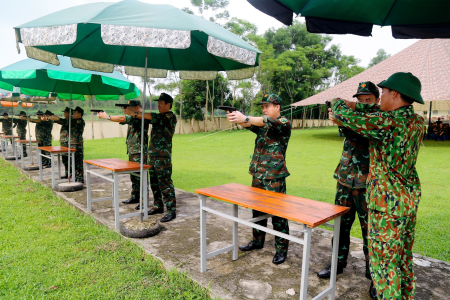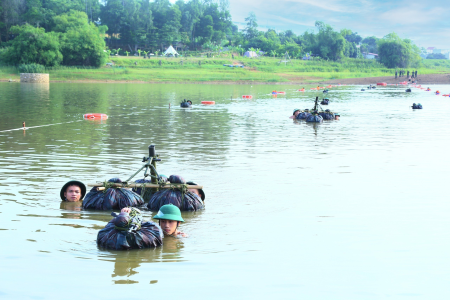Hanoi Capital High Command’s Military School improves the quality of education and training
The Military School of Hanoi Capital High Command is tasked with training commanders for the Communal Military Commands, reserve officers, non-commissioned officers, technicians; educating and providing knowledge of defence and security for the 2nd and 3rd-level learners (who are the cadres of all ministries, central agencies and branches) and students in colleges and universities in the locality. Thus, the School is diversified in its learners in terms of skills, ages and working positions, with a great number of annual learners and different programmes, aims and time. Meanwhile, the teaching-learning facilities of the School have not yet been synchronised, the staff of managers and teachers are in short some time, with their qualifications not fully meeting the task requirements, etc. Facing this reality, the School’s Party Committee and Board have been drastically and synchronously implementing many guidelines and solutions to attentively improve the quality of education and training, and considering it as the breakthrough which is decisive to the accomplishment of the School’s political tasks presently and in a long run.
At first, strengthening the leadership and direction of the School’s Party Committee and Board, all-level party committees and commands and bringing into play the overall strength of all organisations and individuals for the task of education and training. On grasping and implementing resolutions and plans from the superiors on education and training, directly Resolution No. 1657-NQ/TW, dated 20/12/2022 by the Central Military Commission; Resolution No. 1318-NQ/ĐU, dated 28/02/2023 by the Hanoi Capital High Command’s Party Committee on renovating the education and training to meet the task requirements of building the Capital armed forces in the new situation, the School’s Party Committee and Board have built and issued Resolution No. 684-NQ/ĐU, dated 30/3/2023 on renovating the education and training to meet the task requirements of building the School in the new situation; of which, they have clearly defined the targets, routes and guidelines, solutions in each period and year, also, directed departments, faculties and cadet management units to inform all people; concretised into plans and action programmes which are close to the reality to implement the resolution. In order to gain the defined targets, the School has directed departments, faculties and cadet management units to check, modify and complete the rules and regulations to create the unity in their leadership and direction; actively held seminars and talk-shows in the whole School, brought into play the democracy and collective intelligence in advising and proposing solutions for improving the quality of education and training, etc., through which, to unify the awareness and actions, bring into play the overall strength, responsibility of each cadre, teacher and cadet in doing this important task.
 |
| Firing training for learners of defence and security knowledge course in 2023 |
Thoroughly understanding that building the staff of teachers and educational managers is the key factor deciding the quality of education and training, the School’s Party Committee and Board have directed the functional offices to closely follow the newly-issued payroll schedule (according to Decision No. 593/QĐ-BQP, dated 02/3/2022 by the Minister of National Defence) to check, plan and restructure the department, faculties and cadet management units connected to the implementation of Project of “Building the staff of teachers and educational managers in the Army fully meeting the demands for basic and comprehensive reform of education and training in the Army in the 2023-2030 period”. Accordingly, the Schools has attentively built the schedules and plans of recruiting, training and retraining, which are suitable with the ages, educational levels, skills, working experience to construct the next qualified generations for each working position. In the implementation process, the School has considered bringing responsibility of the party committees and commanders of offices, faculties, units, and all cadres and party members along with each stage of the personnel work processes, especially the ones of remarking, evaluating, using, planning and sourcing. Also, the School has considered training to improve the comprehensive ability for these staffs with many suitable solutions such as sending to military and civilian academies and schools; field trips in units and localities; in-service and specific training; teachers’ self-studying and researching, etc.; regularly maintained the school-level contests of excellent teachers and managers; selected and sent teachers to attend the teaching contest at the Ministry level, considering this as an important measure to annually evaluate and classify the teachers and managers, which is the basis to appoint cadres and make plans of education and training in the coming time. Up to now, 94.2% of the School’s teachers has had bachelor degree, in which 15.2% of them have finished postgraduate education; 65% of its cadres and teachers have experienced suitable leading or managing positions; 40% of its cadres of faculties and subjects have gone through field trips to units and localities. These are the important sources for the School to well accomplish its tasks in the coming years.
 |
| Exercise conducted by cadets of the school in 2023 |
Together with building and developing the staff of cadres and teachers, the School has focused on comprehensively and synchronously reforming the training processes, programmes, contents and learning-teaching forms and methods. On grasping and implementing the motto that “Training quality of schools is the combat readiness capacity of units”, the School has proactively coordinated with other units and localities to survey and evaluate the reality of graduated cadets; received opinions from leaders and commanders of units in order to update, complement and build the detailed training programmes for all learners, making them close to the defence and security tasks of the Capital. Currently, the School has actively implemented the Project of “Reforming training processes and programmes for cadres at all level in the military to meet requirements in the new situation” by the Ministry of National Defence; standardised the training programmes towards continuity, inheritance, integration, practicality and development, which are suitable with the knowledge and expected learning outcome of each training object. The School has focused on researching and adjusting the programmes, increasing the practical training time; timely updating and complementing new issues of the local defence, security and building the defence zones tasks, combat objects, plots and tricks of hostile forces, etc. Together, the School has attentively reformed the contents and methods for conducting course-end military exercises for cadets close to the reality so that they can consolidate their knowledge, skills and commanding ability, ensuring the successful accomplishment of the tasks and responsibility after graduation. Owning to covering many training objects with a variety of training programme frameworks, aims and time, etc., the School has directed the faculties to actively change their teaching methods suitably with the learners towards the combination between the traditional methods and modern ones, taking learners as the centre, at the same time, change the learners’ learning methods, especially improve the quality of self-study in order to bring into play their creativity and independence to turn the training process into self-training one. For each lesson, the School asks the teachers to integrate and flexibly make use of several methods including explanation, conversation and observation, apply the information technology (IT) into their lectures, promote the cadets’ proactiveness in their studying. Besides, the School has actively reformed the ways of tests and exams; enhanced the examination and re-examination of the training quality. Notably, the School has conducted and gained good results with the multiple-choice tests and free-response ones using open questions in the final exams of some subjects; all of these have helped cadets train their thinking capacity, skills of applying theories into the real work of military and defence in localities, making sure that, after graduation, they could undertake their responsibility, tasks, and be highly appreciated by the units and localities.
One of the important solutions receiving much concern by the School is to provide adequately, synchronously and effectively teaching-learning facilities and means for the best education and training. Closely following the instructions from Hanoi Capital High Command, the School has closely coordinated with the functional offices to proactively research, build projects, programmes and plans on providing the teaching-learning facilities towards modernity, science and practicality to meet the immediate and long-term tasks. Among them, the School has attentively brought into play the role of the Steering Committee 126 in directing and operating the plan on using the system of facilities and documents of subjects for learners; researching and writing books and documents; making initiatives, learning models, tools and facilities for teaching which are practical with the School’s teaching-learning reality. Presently, in order to meet the demands for building the “Smart school to approach the 4th Industrial Revolution” and carry out the digital transformation target, the School has attentively invested into developing the IT infrastructure towards standardisation and modernisation, creating the foundation for the renovation and improvement of the quality of education and training. By efficiently using the fund from many resources together with well bringing into play the internal strength, the education and training facilities have been invested quite sufficiently, synchronously and modernly, especially the system of lectures rooms, the Centre of Training Management, the Centre of defence and security Education, and the digitalised library. Systems of training and practice grounds, shooting ranges, swimming pools, physical training areas, etc. have been basically built, which has well served the cadets’ learning demands; 100% of its teachers have been equipped with PC connected to the military network, e-libraries and software for research and teaching purposes.
By implementing synchronously the above-mentioned solutions, the quality and effectiveness of education and training of the School have been continuously improved, which has made contribution to building the human resources for the armed forces of the Capital on a par with the task requirements in the new situation. These results are the important foundations for the Military School of Hanoi Capital High Command to continuously improve the quality of education and training, deserving to be the training centre of cadres, technicians, defence and security education of the whole Capital.
Senior Colonel DO HONG THAI, Principal of the School